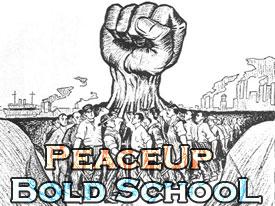One of the mainstays of effective organizing that is increasingly being touted as critical to the success of any movement is telling one’s story. Without a reinforced sense of human impacts and the telling of individual passions and motivations, our movement narratives will often fall flat. This applies to communities as much as to people. In that spirit, here is Peaceful Uprising’s story of 2012.
Like any good story, our year had an overarching theme: Resilient Resistance. 2012 began with Peaceful Uprising in financial ruins. A year ago we lost over $80,000 due to malfeasance on the part of our former fiscal sponsor, the International Humanities Center. We weren’t entirely sure how we would survive and came together as a community to find solutions. We reaffirmed our desire to continue working toward our mission of defending a livable future – and we hold that vision as fodder for evermore creative, resourceful and resilient ways of funding that mission. We are grateful to the support of Living Rivers, who is serving as our new fiscal sponsor. We can definitely use some help. Please consider donating today!
The loss of capacity that resulted from the loss of our funds necessitated that we go inward and examine our structure. We are ensuring that our decision-making is as horizontal as possible – shifting discussions of strategy and goals from our Advisory Board to our Leadership group. We became more involved in our community and nourished our relationships with local allies such as Utah Tar Sands Resistance, Before It Starts, Move To Amend SLC, ALEC Welcoming Committee, United for Social Justice, Prison Divestment Campaign, HEAL Utah and the Salt Lake Dream Team.
Indeed, our work with the Dream Team caused us to begin deepening our analysis of climate justice. We joined with them in planning an action where we connected the dots between climate change and the quest for immigration rights – realizing that as environmental degradation worsens, immigrants and communities of less privilege could be scapegoated as causing the resulting economic impacts at the same time that peoples in the Global South could become climate refugees as their home bioregions become increasingly uninhabitable. We continue to bring a deeper analysis and awareness of climate justice to our efforts and to the larger movement.
We have begun to really hone in on a large component of realizing climate justice: anti-oppression, which we prefer to call by the more forward-looking designation of “radical inclusion”. Indeed, we recognize that what we are looking for is not simply a cleaner, greener version of the system we now inhabit, but a radically shifted paradigm that embodies true justice for all.
To achieve true justice for all requires that our movement and our work incorporate radical inclusion as a foundational practice; for unless we journey together with radical inclusion, we will not reach our goal of radical inclusion.
 Radical Inclusion was one of the debut offerings of our Climate Justice Bold School: A Year of Advancing Radical Agents of Change. After its launch in October, where we explored Theories of Change and the Abolitionist Resistance, we joined with our friends from Inclusion Center to do some very focused work around anti-oppression. We look forward to continuing this work in 2013.
Radical Inclusion was one of the debut offerings of our Climate Justice Bold School: A Year of Advancing Radical Agents of Change. After its launch in October, where we explored Theories of Change and the Abolitionist Resistance, we joined with our friends from Inclusion Center to do some very focused work around anti-oppression. We look forward to continuing this work in 2013.
 Another highlight of our work in 2012 centered around exploring the balance between Resistance and Resilience. We launched a new project, Communities of Resilient Resistance, with online tools and resources in five elemental categories: Beloved Community, Personal Transformation, Telling a New Story, Resilience and Resistance. We began the practice of quarterly Community Audits, wherein we established a new principle of action: pairing resistance with resilience to demonstrate the valuable dependence of one upon the other. In these Community Audits, we highlight a source of injustice in our community, and at the same time highlight a source of hope. For example, for our Spring 2012 Community Audit we joined with Utah Tar Sands Resistance to perform guerilla theater in the offices of Utah’s School and Institutional Trust Lands Administration (SITLA) to protest their leasing of pristine wilderness for tar sands development. The same week, we joined with the Salt Lake Dream Team to plan the solidarity event described above.
Another highlight of our work in 2012 centered around exploring the balance between Resistance and Resilience. We launched a new project, Communities of Resilient Resistance, with online tools and resources in five elemental categories: Beloved Community, Personal Transformation, Telling a New Story, Resilience and Resistance. We began the practice of quarterly Community Audits, wherein we established a new principle of action: pairing resistance with resilience to demonstrate the valuable dependence of one upon the other. In these Community Audits, we highlight a source of injustice in our community, and at the same time highlight a source of hope. For example, for our Spring 2012 Community Audit we joined with Utah Tar Sands Resistance to perform guerilla theater in the offices of Utah’s School and Institutional Trust Lands Administration (SITLA) to protest their leasing of pristine wilderness for tar sands development. The same week, we joined with the Salt Lake Dream Team to plan the solidarity event described above.
As 2012 comes to a close, Peaceful Uprising is dedicated to continuing the narratives that arose and took shape this past year. In 2013, we will continue to explore what it could look like to practice radical inclusion, we will deepen our analysis of climate justice, we will further experiment with the balance of Resilient Resistance, and we will continue to Advance Radical Agents of Change with our Bold School. We invite you to join us as together we write the ongoing narrative of defending a livable future for all.
Leave a Reply